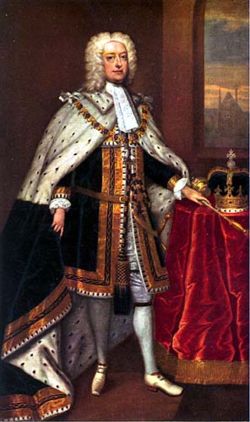|
HISTORICAL BACKGROUND
THE AUGUSTAN AGE [E1] [E2]
In 1714, when Queen Ann died without leaving any heirs, the English throne passed to her nearest Protestant relative, George of Hanover, who became king under the name of George I of England [E1] [E2] [I1] [ES1] . Thus the dynasty of Hanover [F1] [ES1] succeeded that of the Stuarts. 
England was now ruled by a German prince, who spoke no English, had no real comprehension of his people and showed little interest in English political life, preferring Germany to England, which made him extremely unpopular. No wonder that during his reign a Jacobite rebellion broke out in Scotland (1715) on behalf of the Catholic Stuart pretenders. It was put down by a small English army.
George I left the government of the country in the hands of his ministers, whom he chose from the Whig party. The fact that the ministers were all Whigs led to the development of a Cabinet, which Britain has still today, and to the emergence of a leading minister in the Cabinet, who came to be known as the Prime Minister; the first Prime Minister was the Whig Sir Robert Walpole. Walpole supported a policy of peace and toleration, thus managing to keep England out of foreign conflicts, which allowed trade to flourish and gave England prosperity and political progress.
Walpole survived a change of monarch, when George I died and was succeeded by his son, George II [E1] [E2] [I1] [ES1]
 . In the meantime a new attempt to seize the throne was made by a second Jacobite rising led by a Stuart descendant, Charles Edward (generally known as Bonnie Prince Charlie). The Catholic rebels were severely defeated at Culloden in 1745, so that Protestantism and the Hanoverians were saved. Yet the country now required a different domestic and foreign policy and it was Prime Minister William Pit (1708-1778) to introduce a policy that could make Britain economically strong, powerful in trade and wealthy. Thanks to William Pitt the Elder’s ability the English triumphed in the Seven Years’ War against Austria, France, Russia and Spain, defeating its old enemy, France, on the three continents and securing colonies (the war led to England’s control of a great part of India and of Canada) , its command on the seas and its own mercantile and industrial supremacy.
. In the meantime a new attempt to seize the throne was made by a second Jacobite rising led by a Stuart descendant, Charles Edward (generally known as Bonnie Prince Charlie). The Catholic rebels were severely defeated at Culloden in 1745, so that Protestantism and the Hanoverians were saved. Yet the country now required a different domestic and foreign policy and it was Prime Minister William Pit (1708-1778) to introduce a policy that could make Britain economically strong, powerful in trade and wealthy. Thanks to William Pitt the Elder’s ability the English triumphed in the Seven Years’ War against Austria, France, Russia and Spain, defeating its old enemy, France, on the three continents and securing colonies (the war led to England’s control of a great part of India and of Canada) , its command on the seas and its own mercantile and industrial supremacy.
 2/15
2/15

|